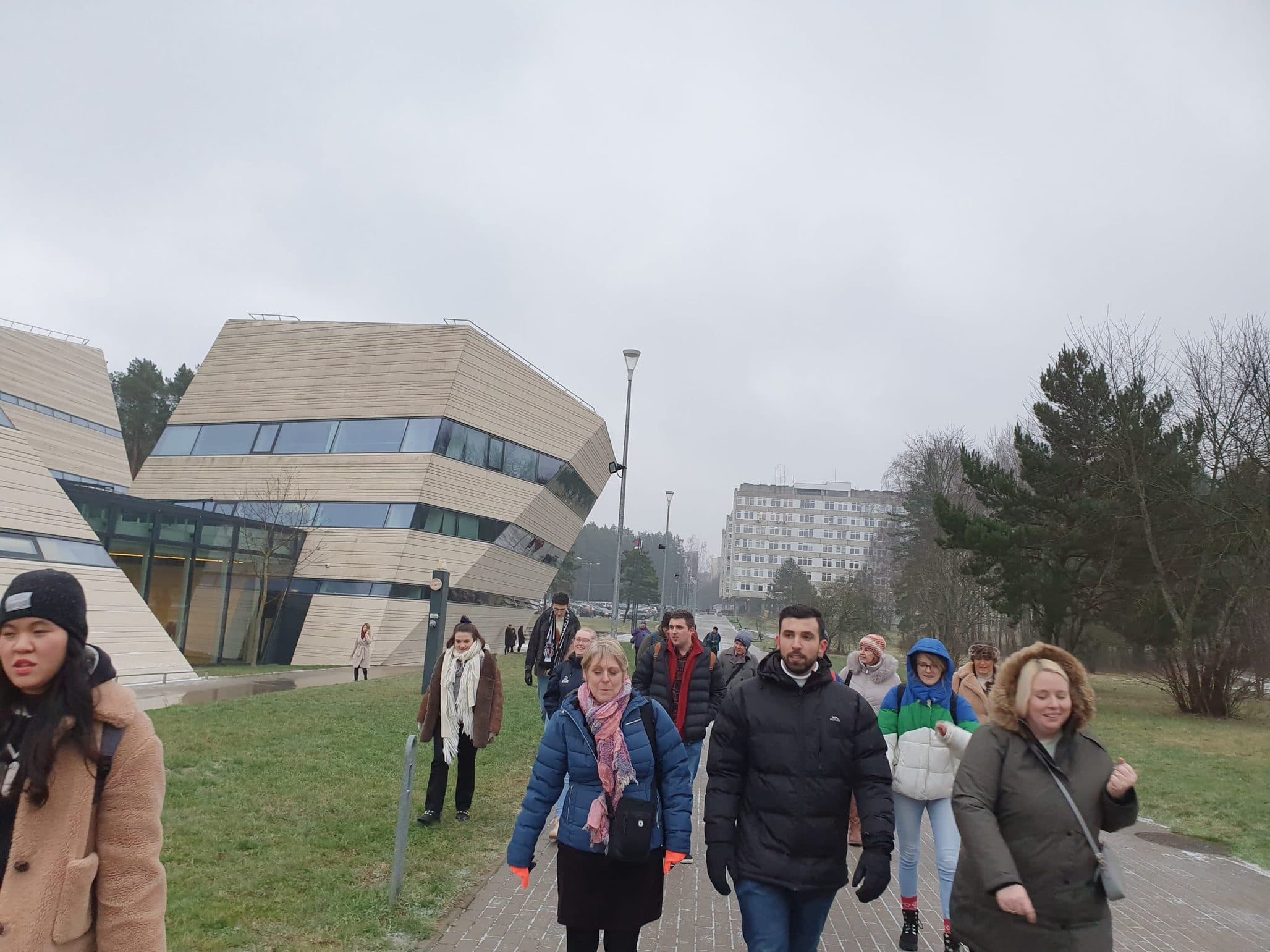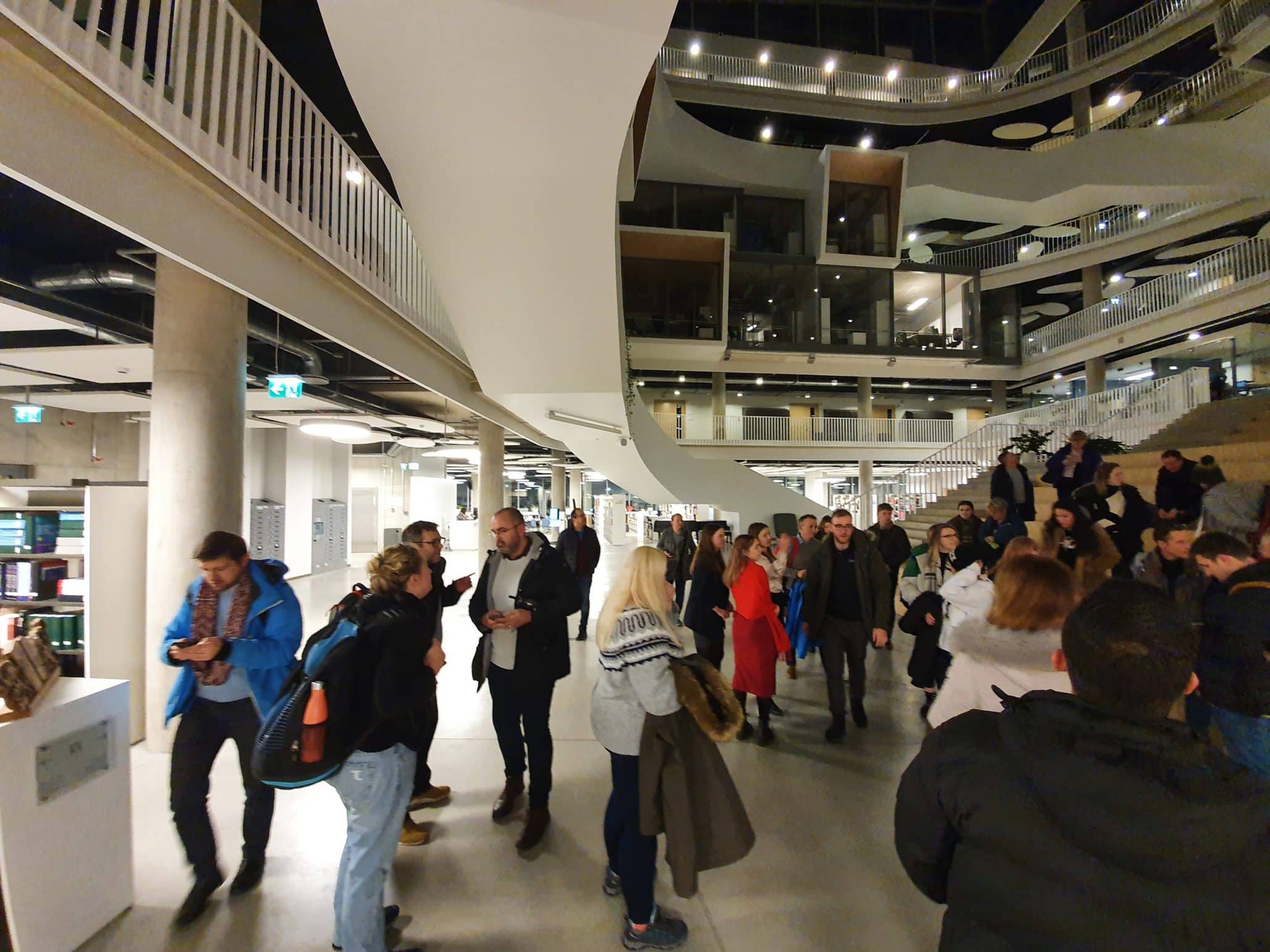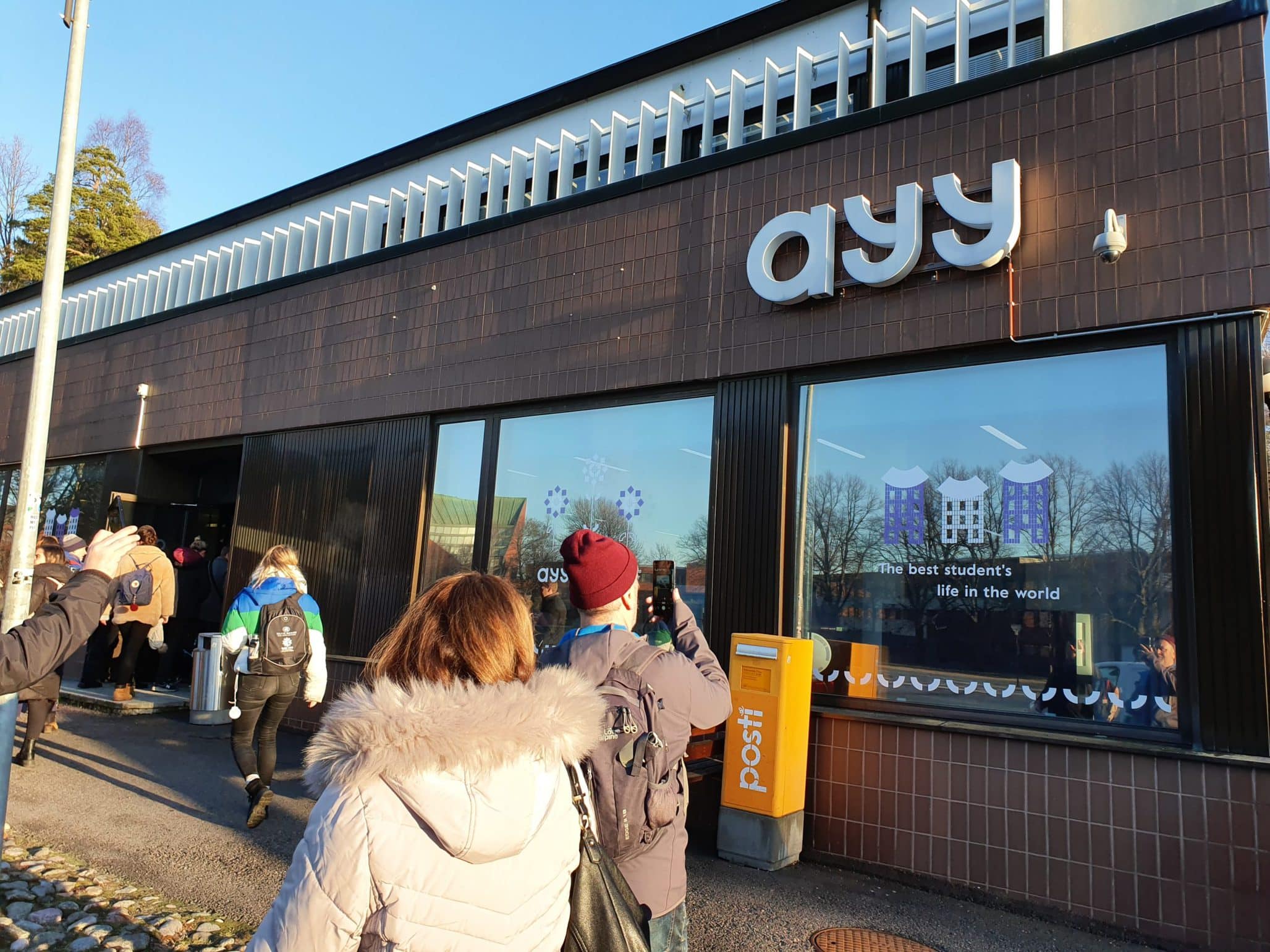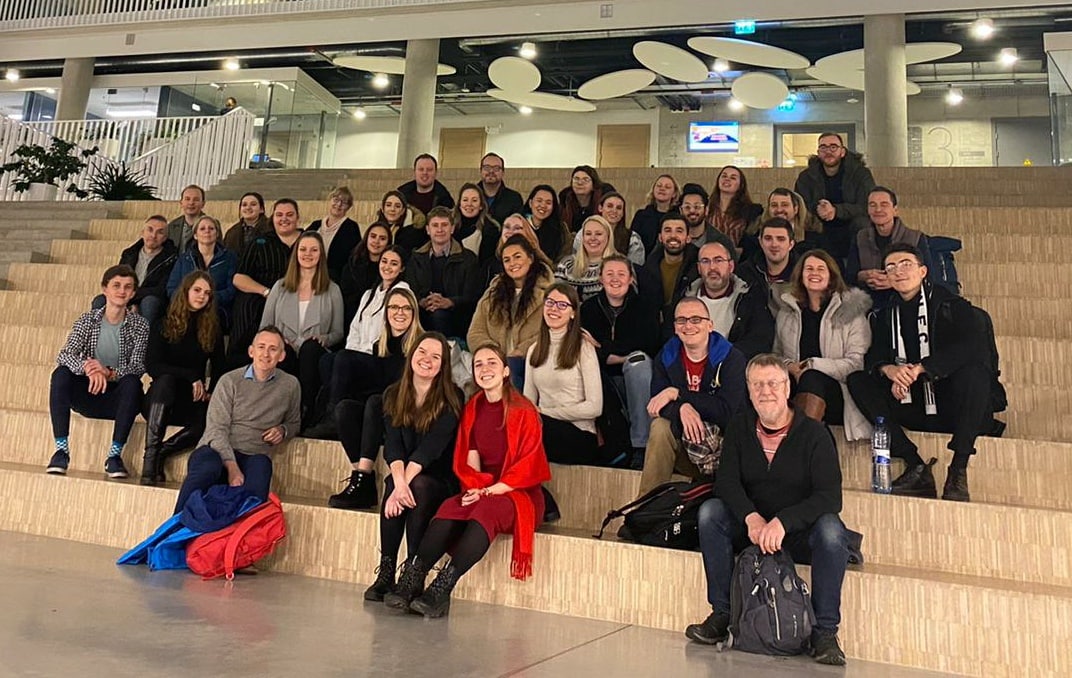There’s nothing like a tour around a group of Baltic and Finnish universities and SUs to bring home hard the reality that we’re about to leave the EU.
For the young people on the Wonkhe SUs European Study Tour – fifteen SU officers keen to strengthen bonds with and collaborate with counterparts – the embarrassment whenever Brexit or Boris came up was palpable, as was the near-perfect English on offer from the usually unpaid, part-time student leaders. News had reached our partners that “Boris had pulled out of Erasmus”, which whilst not quite the actual position was reminder of the way in which signals are received on other shores.
The tour took in both some of the poorest institutions in Europe, as well as the world’s richest SU in Helsinki – and gave participants lots to think about as the debate over the UK sector and its future hots up here.
Lithuania
We kicked off the trip meeting the Lithuanian National Union of Students (Lietuvos studentu sajunga – LSS) who gave us a glimpse of some of the big issues students are facing.
Mental health is a real issue – and there LSS has funding from the department of health to provide counselling staff in major cities where the services are inadequate (“because some students have to wait over a week”). It’s just one of lots of projects funded by both national and local government where student organisations are trusted and supported to provide student-led solutions to problems.
Course quality is a big issue too. Academic staff are amongst the most poorly paid in Europe, and LSS has a major campaign running to ensure that academic staff are appropriately skilled and trained in both teaching and pastoral support – as well as improving their pay. There were interesting reflections for UK SUs that have tended to support lecturer pay campaigns but have been more shy on their training and qualifications.

At Vytauto Didžiojo University in Kaunas, the SU runs some fascinating events. Their Freshers’ summer camps attract hundreds of students to take part in teambuilding and games – and cleverly involve both “residential” students and local commuters. It means that students arrive at the university with an additional, cross departmental friendship group to that provided by course or accommodation – and they are better prepared for the year ahead as a result.
And at Kaunas University of Technology SU, they’re gearing up to be the European Capital of Culture in a couple of years time – where they’ll build on their annual student festival that showcases student talent and contribution for the whole city. There’s little trace of town gown tensions here.
Latvia
One of the stranger phenomena we came across in Latvia was student “corporations”.
Following traditions similar to those found in Germany, multiple strictly gendered fraternities and sororities belong to an old academic tradition which dates back to the 14th century, when university students came together on the basis of geographic or national principle, and later, according to common interests or study specialty.
The fraternities came first with the first Latvian male corporation founded in Riga (Selonija), founded in 1880 at the Riga Polytechnicum. The first female corporation (Daugaviete) followed in 1921 and after a period of not running during Soviet occupation, today there are 23 fraternities and 13 sororities with about 10,000 members in total – impressive in a country whose population is under 2 million. Not all students are impressed, though – the President of the University of Latvia’s SU turned up at the first meeting, saw that unlike the more physical fraternities the sororities “just sit drink coffee and speak about literature” and instead decided to get involved in student leadership.
This is a young country but one whose student representation is very grown up – they take student leadership very seriously. SU funding is guaranteed at 1/200 of a university’s budget. As in Lithuania, students have at least 20% of the seats on university committees. Last year the Government funded two major national campaigns, run through local and national SUs on student rights, representation and influence. Students are directly invited to comment on all government matters and decisions. They do all of this because they are so keen on citizenship being a core facet of the university experience.

Astonishingly, student reps have the power of veto on all matters discussed by committees that relate to students. With great power comes great responsibility, of course – it’s a nuclear button rarely used but it does mean that students are taken seriously, and the (part time, rarely paid) student members put in a lot of effort to make their contributions and proposals thoughtful and credible.
Across the Baltics the population is ageing and student numbers have been falling – but high non-continuation rates and tightening national budgets still mean that there’s concern about who does and doesn’t get to go. Just as the UK kicks off two admissions reviews, Latvia is looking at the issue with some proposing a minimum grade threshold at A level equivalent to go to university. It’s the impressive (largely women) student leaders at Latvijas Studentu apvienība (Latvia’s NUS) that are leading the fight against – pointing out that many are let down by their schooling and that if applicants have to be screened it should be on academic potential, but blunt signals of “merit”.
Estonia
In my filter bubble at least, nationalism is a pretty dirty word – associated with petty “little England” people, pro-Brexit views and shades of racism. But in Estonia we got a different perspective.
A country which only reclaimed its independence in 1991, it was students and young people that led its “singing revolution” in the late 90s, when hundreds of thousands of Estonians gathered publicly to sing revolutionary songs they created in an effort to end decades of Soviet occupation – a very Estonian non-violent struggle for freedom.
Today it has a population of just 1.3m that is both ageing and falling, and that has a big impact on HE. Many students study elsewhere in Europe and never return, and the sector has faced major drops in its student numbers over the past decade – placing a major pressure on university budgets and causing a contemporary row over the potential introduction of tuition fees. Institutional mergers are on the cards, reforms to governance are being encouraged (in a country where VCs are still elected) and strictly enforced outcome agreements often mean a mismatch between government funding that needs graduate skill “bang for buck” but through institutions whose academic autonomy has been guaranteed in law for centuries.

There’s barely a hint of marketisation in Estonia, and Tartu was a university where student feedback and voice is taken so seriously that mid and end of module feedback is published openly for all in the university to see. It’s a powerful reminder that better pay and conditions for staff (which Tartu’s SU were campaigning for last term) and better rights for students to influence their education are not mutually exclusive.
Finland
If you’ve just spent three days in the Baltics, one of the things you are primed for as you leave the “ice breaking” ferry from Riga to Helsinki is the cost of things to suddenly rocket now you’re in Scandinavia.
So imagine our surprise when we get off the coach at Turku University to find coffee for 30 cents – and a delicious hot mean for just 2.30 Euros. The “student hot meal” at a regulated price is guaranteed at universities across Finland – partly subsidised by the government, and delivered at Turku by an SU owned cafeteria. And that price is set by the equivalent of NUS Conference. It reflects a desire not only to fund students’ costs, but also keep the prices they face low – an approach that would help in the UK.
The other big cost for UK students remains accommodation, and here we found another fascinating model. Some 9,000 bedspaces at Turku are owned by an organisation 49% owned by the SU and 51% owned by the municipality – the local university isn’t involved at all. Prices are low and standards are high. If only we could get that kind of vision going somehow in the UK.
Student health care is a bit of a mess back at home – local NHS services are often not geared around the fairly specialist needs that students face in relation to mental and sexual health, and the line between university services and NHS services is increasingly blurred and fraught as blame passes around for students being let down.
So we were amazed to learn that in Finland there’s a national student NHS – integrating a range of student-focussed specialist services that are delivered by an organisation with student involvement at all levels, including its board. It’s an inspiring model that looks like it really works to support learning and “joins up” prevention, care and support – and might even be possible in, say, London, Wales, NI or Scotland – or perhaps Manchester where regional devolution is developing.

As in the Baltics, student representation here is a serious business. At Turku the underpinning governance model of the university is tripartite – all committees feature a third academics, a third professional services staff and a third students. It’s a model which promote cooperation, effective solutions and respect for everyone that works at the university to make it a success, and an interesting answer to the question often posed in the UK – “who is the university”.
Helsinki University’s SU has assets in property of almost $0.5bn. That all started when students fundraised to get their own building on a bit of bog land near the university in the 1860s. Today its subsidiary “real estate and financial investments” business owns and rents out property and runs student restaurants across the city, turning over €33.5 million in 2018 and delivering a net operating result of some €7.6m.
A poke around YLVA’s website, along with its unicafe, well cafe and hostel bub brands, is quite astonishing. These are huge businesses doing ethical investments, ethical business practices and really driving sustainability work in the city. But they’re still highly student focussed. In a city that’s not known for being cheap, unicafes offer healthy food at dazzlingly low price for students. How have we let services like this slip though our fingers in the UK?
A Finnish focus on consensus building was evident at Aalto University’s SU too. Here as in the other countries we visited, the central student leaders are chosen indirectly from a council of 45 students, the council elected by a cross campus ballot where over 400 students stood and form groups and parties focussed around issues, departments or even political parties. At Aalto – a proudly modern university, formed of three others and whose branding looks to the future rather than desperately trying to fabricate a past as is the case so often in the UK – students get academic credit for volunteering and there’s a strong programme of “Fresher Education” where the university and union’s values are properly taught, rather than being handed out on a leaflet. No wonder they offer the “world’s best student experience”.
Fifteen visits in five days
There is deceiving romance to trips like this – other countries put their best face on, and the camaraderie of a coach trip can cloud clarity of thinking and real challenge to what’s being presented.
But there was much for student leaders to learn from the visit, and a sense that whilst we have been traditionally strong at academic co-operation with Europe, we’ve been less good at that when it comes to students and professional services. As the UK leaves the EU the need to redouble efforts to promote and increase co-operation for mutual benefits feels more important than ever.

Jim has been blogging in more detail about the study tour over on the Wonkhe SUs site here.












